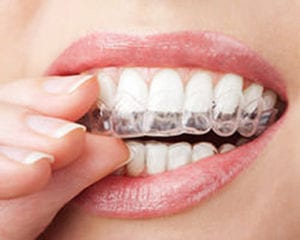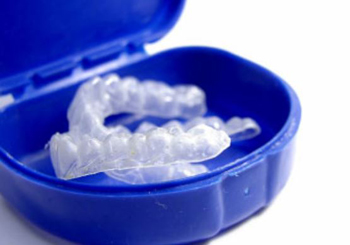Are you trying to determine the best way to whiten your teeth before getting dental crowns? Several keys will ensure your crowns match your newly brightened smile.
1. How Much Is Enough?
Although there is no specific limit on how long to whiten your teeth, the longer you use the bleaching gel, the whiter your teeth will get. Keep in mind that sensitivity can become an issue. And the pace of whitening will decrease over time.
2. Questions to Ask Yourself Before Teeth Whitening
- How satisfied am I with the color of my teeth?
- How much have I bleached them in the past?
- Has the bleaching gel I’m using made a difference?
3. How Much Time Should You Whiten Each Day?
In general, you should keep the bleaching trays on your teeth for a minimum of 20-30 minutes. But it can stay on longer. The length of your daily whitening time depends on whether the bleaching gel is causing a lot of sensitivity in your teeth.
4. What Time of Day Is Best?

Custom teeth-whitening trays seal bleaching gel against your teeth
You can whiten your teeth during the day or at night. One advantage of nighttime use is that while you’re sleeping your, saliva flow decreases. The bleaching gel will stay in the trays longer. Although daytime use is effective, increased saliva flow can water down the gel. Custom bleaching trays fit snugly and keep saliva out, but if you don’t have them, the bleaching gel will get diluted. You will need to rinse the trays and replenish the gel.
5. What If You Overdo It?
Your teeth will let you know if you’ve whitened them too much. They will become sensitive to heat and cold. But you can manage the sensitivity in one or more of the following ways:
- Take ibuprofen daily
- Ask your dentist for fluoride gel
- Use Sensodyne toothpaste, which is for sensitive teeth.
6. When to Stop Whitening Your Teeth Before Receiving New Dental Crowns
After you’ve completed the whitening sessions, oxygen bubbles from the peroxide gel will continue to disperse and whiten your teeth. It takes about two weeks for the color to stabilize. If you’re receiving crowns on your front teeth, wait the full two weeks before visiting your dentist to match them to your natural teeth.
7. Before You Receive Your Crowns
It’s best to find a skilled cosmetic dentist who will guide you through the whitening process and provide lifelike dental crowns that perfectly match your natural teeth. A dependable cosmetic dentist will never be satisfied with taking a chance on matching the crowns with your whither teeth. Ask yourself, “Is this the right dentist to give me a new smile?”
Although you might think crowns are the best solution for the issues with your teeth, an experienced cosmetic dentist will explain your options. Look for a nearby accredited cosmetic dentist. Accredited cosmetic dentists have demonstrated their skill by completing rigorous exams and submitting successful patient cases to the American Academy of Cosmetic Dentistry.
8. After You Receive Your Crowns
Over time, your teeth will pick up stains from coffee, tea, wine, smoking, and certain fruits. Every six months, you can whiten your teeth for a few days to restore their brightness. Be careful not to overdo it because they will no longer match your dental crowns.
This post is sponsored by accredited cosmetic dentist Michael Szarek, DMD of Lowell, MA.

